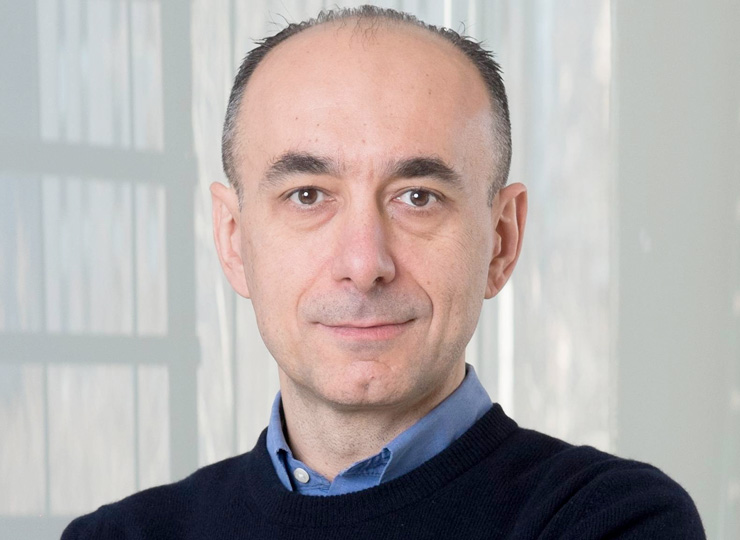
September 22, 2021
At the onset of the pandemic, Jean-Laurent Casanova set out to answer the question “why is there so much variation in disease outcome in COVID-19?” His initial landmark findings appeared in back-to-back papers published in the same issue of Science, in October 2020. The papers resulted from a global effort to sequence DNA from more than 1,000 patients. One of these remarkable studies showed that individuals with severe infection were highly enriched for mutations that knock out genes encoding type I interferons, which activate antiviral responses. (Generous support from the Fisher Center Foundation helped to make this work possible.)
In the companion paper, the international consortium showed that another subset of severely affected patients produced antibodies to their own type I interferons, preventing their antiviral activity. These autoantibodies were exclusively found in patients with severe infections, and not in those with mild infections. At the time of publication, Dr. Casanova proposed that autoantibodies against interferon were likely present in the patients prior to infection. Dr. Casanova’s discoveries of inherited and acquired type 1 interferon deficiency in severe COVID-19 were highlighted by the journal Nature, in a year-end list of “10 remarkable discoveries from 2020” across all fields of science.
The Casanova lab later reported that autoantibodies against interferon account for approximately 20 percent of COVID deaths. Supporting prior predictions, the research also showed that these antibodies occur in approximately four percent of individuals over age 70 (Science Immunology, August 19, 2021). The finding that antibodies to one’s own interferon appear to change over time suggest that they could contribute to age-dependent severe disease beyond COVID-19. The search for age-related antibody mediation driven by autoimmunity in other diseases is under way and has opened a whole new field.
In another publication in Science Immunology, Dr. Casanova and his colleagues recently reported the discovery of a rare DNA variant associated with severe disease resulting from SARS-CoV-2 infection. The variant occurs in a gene that encodes a molecule called toll-like receptor 7 (TLR7). It was identified in 16 unrelated male patients aged seven to 71 years, who were part of a genetic study of 1,202 males aged one through 99, all of whom presented with “unexplained critical COVID-19 pneumonia.” The variant was not found in a group of asymptomatic or mildly symptomatic individuals, the oldest of whom was 102.
Dr. Casanova and his associates are continuing their search for genetic factors that underlie susceptibility to COVID-19. They are also working to understand why some otherwise healthy children are stricken with multisystem inflammatory syndrome, a rare and potentially fatal condition that occasionally occurs after what may have been a mild SARS-CoV-2 infection. The following page lists six publications appearing in prestigious journals in which Casanova laboratory has acknowledged the Fisher Center for Alzheimer’s Research Foundation during 2020 and 2021.
X-linked recessive TLR7 deficiency in ~1% of men under 60 years old with life-threatening COVID-19.
Asano T, Boisson B, Onodi F,… Casanova, JL.
Science Immunology, 19 August 2021.
Autoantibodies neutralizing type I IFNs are present in ~4% of uninfected individuals over 70 years old
and account for ~20% of COVID-19 deaths
Paul Bastard, Adrian Gervais, Tom Le Voyer, J r mie Rosain, Quentin Philippot, J r my Manry,
Eleftherios Michailidis, Hans-Heinrich Hoffmann, Shohei Eto, Jean-Laurent Casanova +190 authors.
Science Immunology, 19 August 2021.
Neutralizing autoantibodies to type I interferons in COVID-19 convalescent donor plasma
Sara E. Vazquez, Paul Bastard, Kathleen Kelly, Adrian Gervais, Philip J. Norris, Larry J. Dumont,
Jean-Laurent Casanova, Mark S. Anderson & Joseph L. DeRisi.
Journal of Clinical Immunology, 19 August 2021.
Early nasal type I IFN immunity against SARS-CoV-2 is compromised in patients with autoantibodies
against type I IFNs
Jonathan Lopez…Jean-Laurent Casanova, Manuel Rosa-Calatrava, Florence Morfin, Thierry Walzer,
Sophie Trouillet-Assant.
Journal of Experimental Medicine, 06 August 2021.
Harnessing type I IFN immunity against SARS-CoV-2 with early administration of IFN-β
Donald C. Vinh, Laurent Abel, Paul Bastard, Matthew P. Cheng, Antonio Condino-Neto, Peter K.
Gregersen, Filomeen Haerynck, Maria-Pia Cicalese, David Hagin, Pere Soler-Palac n, Anna M. Planas,
Aurora Pujol, Luigi D. Notarangelo, Qian Zhang, Helen C. Su, Jean-Laurent Casanova & Isabelle Meyts,
on behalf of the COVID Human Genetic Effort.
Journal of Clinical Immunology, 08 June 2021.
Inborn errors of type I IFN immunity in patients with life-threatening COVID-19
Qian Zhang […]Jean-Laurent Casanova +128 Authors.
Science, 23 Oct 2020.











